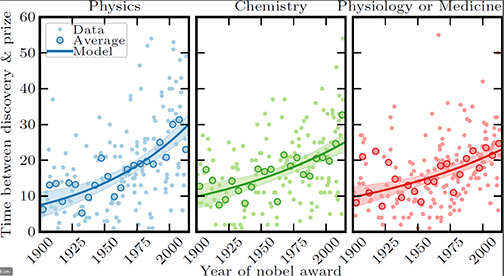Before 1940, Nobel Prizes were a reflection of the rapidly evolving state of science. It was uncommon for an award to happen for a discovery 20 years or more after the research happened, it seemed more like a concession prize because nothing had happened recently - in physics, chemistry and medicine, delayed awards only occurred 11%, 15% and 24% of the time.
By 1985, those percentages were 60%, 52% and 45%. This is only a problem that has cropped up in science and medicine, other prizes are quickly awarded on pop culture status; President Obama was apparently given one, based on when nominations happen, for his first inauguration speech.
Now, since awards are only granted to people who are alive to receive them, a successful researcher of average age could invent a Theory of Everything and never live to get a Nobel Prize for it.

Credit: Aalto University
What changed after 1940? Maybe there were bigger breakthroughs in the early 20th century. Or perhaps there are now so many breakthroughs now it takes time to sort out which ones are actually the best of the best. The cause is up for a debate but if waiting 20 years or more is the norm, Professor Santo Fortunato of Aalto University in Finland wonders how many people are going to die without getting recognized.
"By the end of this century the predicted average age among prizewinners for receiving the award could even exceed his or her life expectancy. Given that the Nobel prize cannot be awarded posthumously, this lag threatens to undermine science's most venerable institution," says Fortunato.